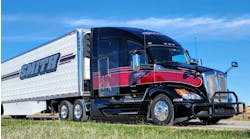Not since the anti-lock brake controversy of the 1970s has a federal regulation raised such a ruckus among trucking interests as the current heavy engine emission standards that took effect on October 1, 2002. The current regulations were imposed as part of a consent decree signed by the major engine manufacturers following some irregularities in previous testing procedures. As a result of the consent decree, regulations that were set to become effective January 1, 2004, were moved forward 15 months to October 2002.
Within that shortened time frame, many major fleets, as well as most of the engine builders, have complained that extensive testing of new engine technology would be difficult at best. Many truckload carriers have simply refused to purchase new trucks before they can complete their own engine reliability programs. The result has been accelerated buying early in 2002 followed by a sharp drop in orders for the fourth quarter of 2002 and early in 2003. In response, truck manufacturers have set up all sorts of special offers to entice buyers.
Not only have fleets been unable to test new engines to their satisfaction prior to the effective date, they also face some uncertainty about which engines at what horsepower ratings will be available. For instance, the Cummins N14 series, long one of the industry's standard engines, is not certified for the new emission standards. No N14s will be available for heavy trucks from this point onward.
Caterpillar has refused to follow conventional wisdom and utilize cooled exhaust gas recirculation to meet the current EPA standards. Instead, Cat plans to use a suite of engine technologies it calls Advanced Combustion Emission Reduction Technology. Cat engines offered after October 1 will have some of the ACERT features but not all until at least January 2003. All Cat engines will contain the entire range of emission technologies by October 2003, the company says. For at least a year, Cat engines will be certified by EPA, but will not be fully compliant with the new regulations. As a result, the company will pay a noncompliance penalty for every engine sold. This penalty will not be passed on to fleet purchasers. Cat will not offer its high-horsepower C16 among those engines for sale immediately after October 2002.
In addition to concerns about increased purchase price, engine residual value, and maintenance procedures and intervals, many fleet operators are unsure what engine horsepower ratings are available. Getting engines certified by EPA takes time, so not all the horsepower ratings that fleets have previously had to choose from are available. Engine builders are certifying their most popular engines first and delaying certification of those at the lower end of the customer demand spectrum.
Engine builder web sites offer one of the best tools for managers to keep abreast of developments from manufacturers, especially as new horsepower ratings are added to the list of certified engines. Caterpillar, Cummins, Detroit Diesel, Mack, and Volvo all have pages on their web sites devoted to their engine certification programs. Some of these pages, such as the one at Mack, provide a detailed set of engine specifications. Others explain the companies' position on certification. All provide a list of certified horsepower ratings. To check on engine certification and ratings, visit the following sites: www.cattruckengines.com; www.tougheststandards.cummins.com; or www.detroitdiesel.com. To check on Mack engines, go to www.macktrucks.com and then select the Mack Power Train button and the Engines button. For information from Volvo, go to www.volvotrucks.us.com. Use the Products menu to select Volvo Power and then select VE from that menu.


